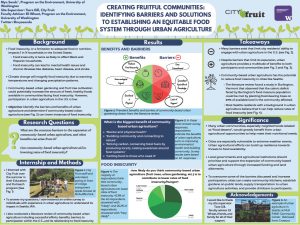CREATING FRUITFUL COMMUNITIES: IDENTIFYING BARRIERS AND SOLUTIONS TO ESTABLISHING AN EQUITABLE FOOD SYSTEM THROUGH URBAN AGRICULTURE
Food insecurity, or a limitation to adequate food or nutrition, is a prevalent issue today, impacting 1 in 9 households in the United States. Food insecurity is also twice as likely to affect Black and Hispanic households and can lead to chronic illness and mental health issues. The purpose of this study was to identify if community-based urban agriculture can lower instances of food insecurity within urban environments, as well as the barriers and benefits to engaging in this form of agriculture. To accomplish this task, I worked with the nonprofit City Fruit where I attended volunteer and education events and created resources on fruit trees and food equity. I also conducted a literature review of community-based urban agriculture including its relationship to food insecurity, successful efforts, and barriers to participation. Additionally, I administered an online survey to understand community perceptions of the benefits and limitations to urban agriculture. Findings show that urban agriculture aids in lowering rates of food insecurity. Urban agriculture also provides communities with emotional, physical, and socio-ecological benefits. Major barriers to engaging in urban agriculture include large time commitments, a need for specialized agricultural knowledge, and a lack of support from city officials and agricultural agencies. Given that community-based urban agriculture both lowers rates of food insecurity and provides a multitude of benefits, local governments and agricultural institutions should prioritize and support its expansion. If the current rates of food insecurity are reduced, we can begin to create a more equitable society.
